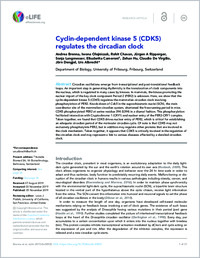Cyclin-dependent kinase 5 (CDK5) regulates the circadian clock
- Brenna, Andrea Department of Biology, University of Fribourg, Fribourg, Switzerland
- Olejniczak, Iwona Department of Biology, University of Fribourg, Fribourg, Switzerland
- Chavan, Rohit Department of Biology, University of Fribourg, Fribourg, Switzerland
- Ripperger, Jürgen A. Department of Biology, University of Fribourg, Fribourg, Switzerland
- Langmesser, Sonja Department of Biology, University of Fribourg, Fribourg, Switzerland
- Cameroni, Elisabetta Department of Biology, University of Fribourg, Fribourg, Switzerland
- Hu, Zehan Department of Biology, University of Fribourg, Fribourg, Switzerland
- De Virgilio, Claudio Department of Biology, University of Fribourg, Fribourg, Switzerland
- Dengjel, Jörn Department of Biology, University of Fribourg, Fribourg, Switzerland
- Albrecht, Urs Department of Biology, University of Fribourg, Fribourg, Switzerland
-
05.11.2019
Published in:
- eLife. - 2019, vol. 8, p. e50925
English
Circadian oscillations emerge from transcriptional and post-translational feedback loops. An important step in generating rhythmicity is the translocation of clock components into the nucleus, which is regulated in many cases by kinases. In mammals, the kinase promoting the nuclear import of the key clock component Period 2 (PER2) is unknown. Here, we show that the cyclin-dependent kinase 5 (CDK5) regulates the mammalian circadian clock involving phosphorylation of PER2. Knock- down of Cdk5 in the suprachiasmatic nuclei (SCN), the main coordinator site of the mammalian circadian system, shortened the free-running period in mice. CDK5 phosphorylated PER2 at serine residue 394 (S394) in a diurnal fashion. This phosphorylation facilitated interaction with Cryptochrome 1 (CRY1) and nuclear entry of the PER2-CRY1 complex. Taken together, we found that CDK5 drives nuclear entry of PER2, which is critical for establishing an adequate circadian period of the molecular circadian cycle. Of note is that CDK5 may not exclusively phosphorylate PER2, but in addition may regulate other proteins that are involved in the clock mechanism. Taken together, it appears that CDK5 is critically involved in the regulation of the circadian clock and may represent a link to various diseases affected by a derailed circadian clock.
- Faculty
- Faculté des sciences et de médecine
- Department
- Département de Biologie, Département de Médecine
- Language
-
- English
- Classification
- Biological sciences
- License
-
License undefined
- Identifiers
-
- RERO DOC 327941
- DOI 10.7554/eLife.50925
- Persistent URL
- https://folia.unifr.ch/unifr/documents/308310
Statistics
Document views: 155
File downloads:
- pdf: 289
